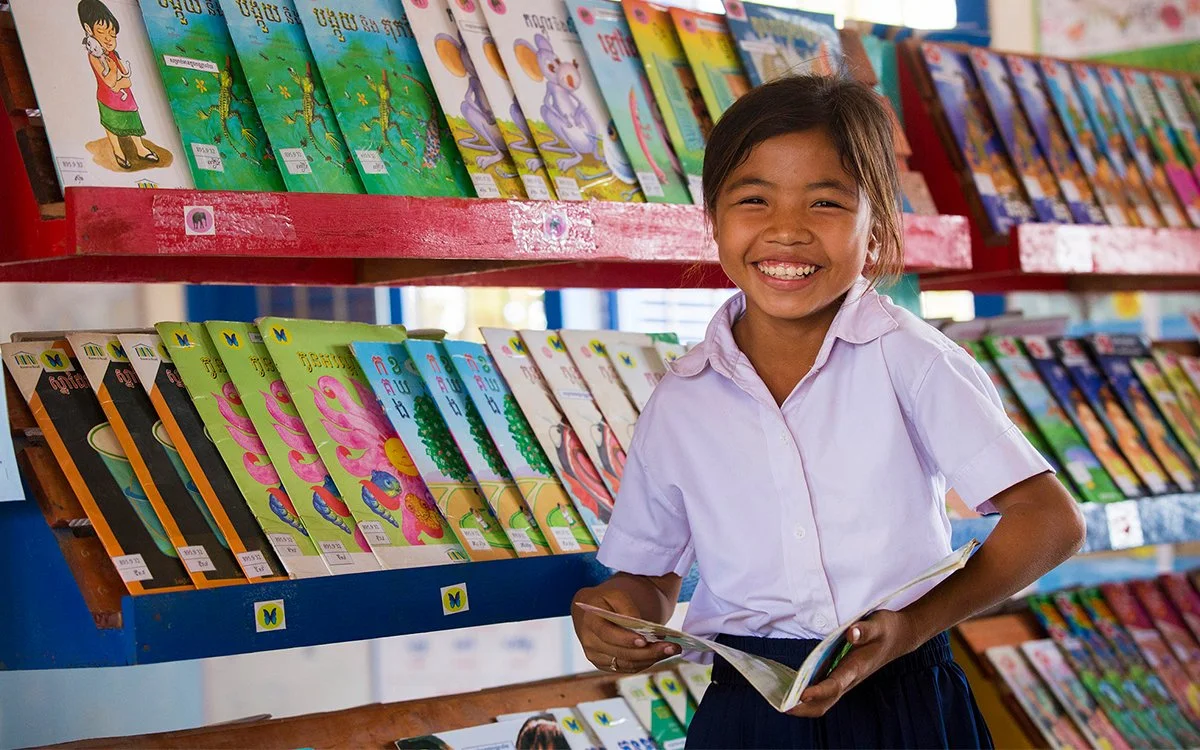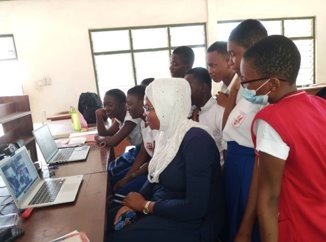By Abie Spangler (Room to Read) and Sarah Bever (IREX)
International Women’s Day is a day to celebrate the strides we have taken in closing gender gaps globally. However, it’s also a time to reflect on what remains to do to drive gender parity. This year’s theme, #EmbraceEquity, allows us to reflect on moving beyond equality to equity – meaning each person’s needs and circumstances are considered so that all people can thrive.
International Women’s Day is also an important time to think about global issues that negatively impact marginalized communities and especially impact women and girls. Over the last decade, the urgency to respond to climate change and drive mitigation and adaptation strategies has continued to increase. Climate change threatens every aspect of our planet and is not gender-neutral, meaning that depending on our identity, we experience the impacts of climate change differently. For example, Climate change causes changes in weather patterns that effect crops leading to poverty, hunger, and migration. It also causes extreme weather that is especially damaging to vulnerable communities with poor infrastructure. Marginalized populations like women and girls experience the most significant effects of climate change because climate change exacerbates the existing gender inequalities that threaten women’s and girls’ health and safety. These gender inequalities lead to disparities in accessing resources and training, decision-making, mobility, education, and information that support people when dealing with an emergency or climate crisis. Furthermore, persisting gender inequalities, together with age and socioeconomic status, put adolescent girls living in poverty in increasingly vulnerable positions with either limited or no ability to voice their concerns. The vulnerabilities they face range from disruptions to their education, increased risk of early or child marriage, human trafficking, lack of food security, and gender-based violence, to name a few.
Climate injustice can be explained by how the impacts of climate change will be experienced differently by various groups of people — depending on gender, age, location, socioeconomic status, etc. — and how some groups and locations will be more vulnerable, or negatively impacted, than others. Further, it also explains how the people most affected by climate change tend to have less voice in driving solutions or contributing to decision-making on mitigation or adaptation strategies. In contrast, those in decision-making positions are typically more prominent contributors to, and less severely impacted by, climate change.
Women and girls are powerful advocates for our planet and should be in decision-making and leadership roles to provide input on mitigating and adapting to climate change. Though, in many cases, women and girls are not provided equitable opportunities to be in leadership positions. To develop these leaders, they must be able to equitably access the education they need to gain the skills and knowledge to lead in the climate movement. Research suggests that investment in girls’ education can deliver effective solutions to climate change in three ways:
An empowering and gender-transformative education for girls (and boys) can help to ensure girls are aware of their rights and have the agency to take control over their lives.
Quality education ensures girls acquire essential skills to participate, succeed, and have leadership careers in green sector industries.
An education that builds opportunities for girls to engage in decision-making and leadership assures them the confidence to take on leadership roles in their households, community, and country.
Awareness that education can support girls in becoming leaders within the climate movement, understanding that female leaders can have an enormous impact on the climate movement, and approaching the climate crisis with a feminist lens are crucial to the success of the movement. Across the basic education sector, organizations are incorporating climate change in targeted interventions within classrooms, schools, and institution. Climate Justice is interdisciplinary and weaves throughout individual lives and communities exacerbating poverty, health issues, access to education, and more.
BEC member Room to Read is beginning a new Climate Justice initiative to provide opportunities for adolescent girls to learn about climate change. The initiative is a 2-year inquiry-based curriculum that answers the questions: What is climate change, what influences it, and what are the underlying causes? What does climate change look like in our world, and what actions can make a meaningful difference?
The Climate Justice curriculum will be delivered in a voluntary afterschool club format to girls in grades 7 and 8. The curriculum will focus on the intersection of gender, climate change, girls’ education, and leadership. Room to Read will pilot this new initiative in Nepal in 2023.
BEC member IREX is at the midpoint in a National Science Foundation research initiative exploring the question: To what extent does participation in a cross-cultural technology-rich team-based Science, Technology, Engineering, and Mathematics (STEM) / Information and Communications Technology (ICT) program impact adolescents’ STEM/ICT career interests, self-efficacy, outcome expectancies, perceptions of contextual supports and global competence? The intervention, called the World Smarts STEM Challenge is targeted towards marginalized communities including girls and under-represented students in the United States, specifically DC area public and charter schools and students across levels of government schools in Ghana.
The program design is informed by research demonstrating the positive effects of problem-based learning and relationship development on STEM education for girls and marginalized communities. Facilitated by teacher mentors, secondary school students use virtual collaboration platforms to create a STEM solution addressing the Sustainable Development Goals (SDGs) of Climate Change and Sustainable Communities. Fusing essential skills such as critical thinking and collaboration with technical STEM skills, students learn about how the SDGs are affecting local communities across the globe, promoting cross-cultural communication and STEM innovation. For example, students learn about solar energy transfer and conduct empathy interviews with a partner to learn about their interests, culture, and families.
Examples of students’ STEM innovations include a purifier device for local fishmongers to reduce air pollution and a waste processing system that safely converts human excrement to biogas, manure, and liquid fertilizer. Initial research and evaluation from North Carolina State University shows increased interest in STEM and STEM jobs for girls after completing the program. As part of the external evaluation performed by Catalyst Consulting Group, a culture audit was done on the curriculum showing that the curriculum adequately and appropriately embeds the lived experience of participants and provides opportunities for them to engage prior cultural knowledge including building community, learning differentiation, and representing diverse cultural perspectives. Areas of strength included providing a welcoming environment and representing different cultural perspectives. This is important because cultural competence is essential for providing equitable learning experiences.
“After the World Smarts STEM Challenge, I thought I could develop my inventions using my own talents to make things that help my community and world”
The road to equity is not straightforward; it is winding and often complex. As education specialists it is our responsibility to meet the moment and address the effects of climate change on women and girls through education, community collaboration, and commitment. Let’s reflect the enthusiasm of one of our World Smarts students in this challenge "I am excited …… [let’s] brainstorm, and exchange ideas for the better of our communities and the world."


